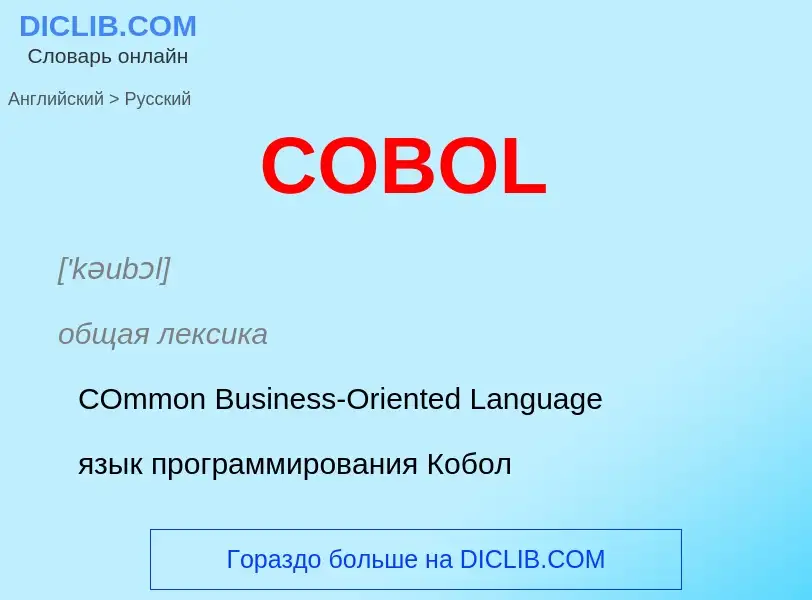Übersetzung und Analyse von Wörtern durch künstliche Intelligenz ChatGPT
Auf dieser Seite erhalten Sie eine detaillierte Analyse eines Wortes oder einer Phrase mithilfe der besten heute verfügbaren Technologie der künstlichen Intelligenz:
- wie das Wort verwendet wird
- Häufigkeit der Nutzung
- es wird häufiger in mündlicher oder schriftlicher Rede verwendet
- Wortübersetzungsoptionen
- Anwendungsbeispiele (mehrere Phrasen mit Übersetzung)
- Etymologie
COBOL - Übersetzung nach russisch
['kəubɔl]
общая лексика
COmmon Business-Oriented Language
язык программирования Кобол
разработан в 1959-1960 гг. объединенным комитетом производителей и пользователей ЭВМ (CODASYL - Conference on Data Systems Languages). Процедурный ЯВУ для экономических задач. Детище Пентагона. В 60-70-е годы наиболее применяемый (до 80% программ) язык программирования в США
существительное
общая лексика
([сокр.] от Common Business-Oriented Language) [информ.]
КОБОЛ
язык программирования для коммерческих и деловых задач
язык программирования для промышленных и правительственных учреждений, КОБОЛ
синоним
['kəubɔl]
существительное
общая лексика
([сокр.] от Common Business-Oriented Language) [информ.]
КОБОЛ
язык программирования для коммерческих и деловых задач
общая лексика
COBOL
исходный текст программы на языке Кобол
Definition
Wikipedia
COBOL (; an acronym for "common business-oriented language") is a compiled English-like computer programming language designed for business use. It is an imperative, procedural and, since 2002, object-oriented language. COBOL is primarily used in business, finance, and administrative systems for companies and governments. COBOL is still widely used in applications deployed on mainframe computers, such as large-scale batch and transaction processing jobs. However, due to its declining popularity and the retirement of experienced COBOL programmers, programs are being migrated to new platforms, rewritten in modern languages or replaced with software packages. Most programming in COBOL is now purely to maintain existing applications; however, many large financial institutions were still developing new systems in COBOL as late as 2006.
COBOL was designed in 1959 by CODASYL and was partly based on the programming language FLOW-MATIC designed by Grace Hopper. It was created as part of a US Department of Defense effort to create a portable programming language for data processing. It was originally seen as a stopgap, but the Department of Defense promptly forced computer manufacturers to provide it, resulting in its widespread adoption. It was standardized in 1968 and has since been revised four times. Expansions include support for structured and object-oriented programming. The current standard is ISO/IEC 1989:2014.
COBOL statements have an English-like syntax, which was designed to be self-documenting and highly readable. However, it is verbose and uses over 300 reserved words. In contrast with modern, succinct syntax like y = x;, COBOL has a more English-like syntax (in this case, MOVE x TO y).
COBOL code is split into four divisions (identification, environment, data, and procedure) containing a rigid hierarchy of sections, paragraphs and sentences. Lacking a large standard library, the standard specifies 43 statements, 87 functions and just one class.
Academic computer scientists were generally uninterested in business applications when COBOL was created and were not involved in its design; it was (effectively) designed from the ground up as a computer language for business, with an emphasis on inputs and outputs, whose only data types were numbers and strings of text.
COBOL has been criticized throughout its life for its verbosity, design process, and poor support for structured programming. These weaknesses result in monolithic, verbose (intended to be English-like) programs that are not easily comprehensible.
For years, COBOL has been assumed as a programming language for business operations in mainframes, although in recent years an increasing interest has surged on migrating COBOL operations to cloud computing.

